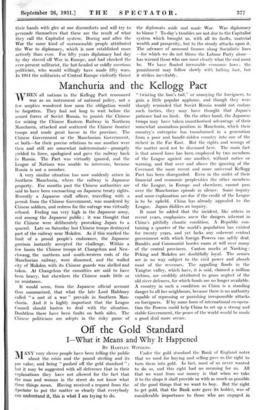Manchuria and the Kellogg Pact
WHEN all nations in the Kellogg Pact renounced war as an instrument of national policy, not a few sceptics wondered how soon the obligation would be forgotten. They .had not long to wait before the armed forces of Soviet Russia, to punish the Chinese for seizing the Chinese Eastern Railway in Northern Manchuria, attacked and scattered the Chinese frontier troops and made great havoc in the province. The Chinese Government or the Manchurian Government, or both—for their precise relations to one another were then and still are somewhat indeterminate—promptly yielded to force, apologized and gave the railway back to Russia. The Pact was virtually ignored, and the League of Nations was unable to intervene, because Russia is not a member.
A very similar situation has now suddenly arisen in Southern Manchuria, where the railway is Japanese property. For months past the Chinese authorities are said to have been encroaching on Japanese treaty rights. Recently a Japanese staff officer, travelling with a permit from the Chinese Government, was murdered by Chinese soldiers, and redress for the outrage was virtually refused. Feeling ran very high in the Japanese army, and among the Japanese public ; it was thought that the Chinese were deliberately provoking Japan to a quarrel. Late on Saturday last Chinese troops destroyed part of the railway near Mukden. As if this marked the limit of a proud people's endurance, the Japanese garrison instantly accepted the challenge. Within a few hours the Chinese troops at Changchun and New- chwang, the northern and south-western ends of the Manchurian railway, were disarmed, and the walled city of Mukden with its Chinese guards was shelled and taken. At Changchun the casualties are said to have been heavy, but elsewhere the Chinese made little or no resistance.
It would seem, from the Japanese official account thus summarized, that what the late Lord Halsbury called " a sort of a war " prevails in Southern Man- churia. And it is highly important that the League Council should hasten to deal with the situation. Doubtless there have been faults on both sides. The Chinese politicians are adepts in the risky game of " twisting the lion's tail," or annoying the foreigners, to . gain a little popular applause, and though they were sharply reminded that Soviet Russia would not endure such tactics, they may have thought that Japan's patience had no limit. On the other hand, the Japanese troops may have taken unauthorised advantage of. their somewhat anomalous position in Manchuria, which their country's enterprise has transformed . in a generation from a poor and bandit-ridden country into one of the richest in the Far East. But the rights and wrongs of the matter need not be discussed here. The main fact is that armed force has been employed by two members of the League against one another, without notice or warning, and that over and above the ignoring of the Covenant the more recent and more universal Kellogg Pact has been disregarded. Even in the midst of their financial and economic perplexities the other members of the League, in Europe and elsewhere, cannot pass over the Manchurian episode in silence. Some inquiry and some explanation arc due if the credit of the League is to be upheld. China has already , appealed to the League. Japan dislikes an inquiry.
It must be added that the incident, like others in recent years, emphasizes anew the dangers inherent in China's pitifully chaotic condition. A Republic con- taining a quarter of the world's population has existed for twenty years, and yet lacks any coherent central government with which foreign Powers can safely deal. Bandits and Communist hordes roam at will over many of the central provinces. Canton mocks at Nanking : Peking and Mukden are doubtfully loyal. The armies are in no way subject to the civil power and absorb most of the revenues. The appalling floods in the Yangtze valley, which have, it is said, claimed a million victims, are credibly attributed to gross neglect of the old river defences, for which funds are no longer available. A country in such a condition as China is a standing danger to all her neighbours, because there is no authority capable of repressing or punishing irresponsible attacks on foreigners. If by some form of international co-opera- tion the Powers could help China to set up a strong and stable Government, the peace of the world would be made a good deal more secure.


































 Previous page
Previous page